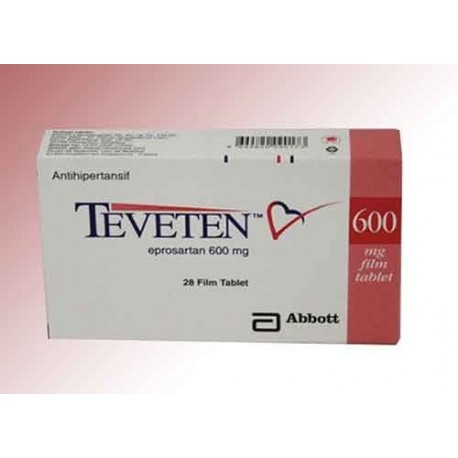 View larger
View larger Teveten (Eprosartan Mesylate) 28 Film Coated Tablets
New product
BUY MORE PAY LESS
| Quantity | Discount | |
|---|---|---|
| 2 | 5% | |
| 3 | 10% | |
| 4 | 15% | |
| 5 | 20% |
Volume discounts
| Quantity | Discount | You Save |
|---|---|---|
| 2 | 5% | Up to $4.90 |
| 3 | 10% | Up to $14.70 |
| 4 | 15% | Up to $29.40 |
| 5 | 20% | Up to $49.00 |
More info
TEVETEN PLUS600 / 12.5 mg Film Tablet It is taken by mouth.
Active ingredient
Each film tablet contains eprosartan mesylate equivalent to 600mg eprosartan and 12.5mg hydrochlorothiazide.
Excipients
Microcrystalline cellulose, bovine lactose monohydrate, pregelatinized starch (corn), crospovidone, magnesium stearate, purified water, polyvinyl alcohol, macrogol 3350, talc, titanium dioxide (E171), iron oxide black (E172), iron oxide yellow (E172).
What is TEVETEN PLUS and what is it used for?
• TEVETEN PLUS contains two active substances called eprosartan and hydrochlorothiazide.
Eprosartan is included in the group of drugs called 'angiotensin II receptor antagonists'. It prevents the effect of a substance called angiotensin II in your body. This substance causes your blood vessels to narrow. This makes it difficult for the blood to flow through the veins and thus your blood pressure rises. By blocking this substance, your veins relax and your blood pressure drops.
Hydrochlorothiazide is included in the group of drugs called 'thiazide diuretics'. It allows you to urinate more often and more. This condition causes your blood pressure to drop.
• TEVETEN PLUS, cream-colored, '5147' written on one side, in capsule form
are tablets.
• TEVETEN PLUS is used in the treatment of high blood pressure.
• TEVETEN PLUS is given only if your blood pressure is not sufficiently lowered by treatment with eprosartan alone.
3. How to use TEVETEN PLUS?
Instructions for proper use and dose / frequency of administration
The usual dose for adults is 1 tablet, taken once a day in the morning.
Take TEVETEN PLUS as your doctor told you. If you are not sure, consult your doctor or pharmacist.
Application route and method
TEVETEN PLUS is for oral use only.
TEVETEN PLUS can be bought hungry or full.
The tablet should be swallowed whole with a glass of water.
Do not crush or chew the tablets
Take the tablets in the morning at the same time every day.
Different age groups
Use in children and adolescents: TEVETEN PLUS should not be used in children and adolescents under 18 years of age.
Use in the elderly
The dosage is the same as for adults.
Special use cases
Kidney failure:
Dose adjustment is not required in patients with renal insufficiency whose cleansing capability of the creatine substance in the blood is above 30 ml / min. TEVETEN PLUS should not be used in patients with severe renal insufficiency.
Liver failure:
The use of TEVETEN PLUS is not recommended in patients with mild-moderate hepatic insufficiency. TEVETEN PLUS should not be used in patients with severe hepatic insufficiency.
Do not forget to take your medicine on time.
Unless your doctor recommends otherwise follow these instructions.
If you have the impression that the effect of TEVETEN PLUS is too strong or weak, talk to your doctor or pharmacist.
If you use more TEVETEN PLUS than you should
If you have used more than you should use from TEVETEN PLUS, talk to a doctor or pharmacist.
If you have used Teveten Plus more than you should, or if someone else has used it by accident, consult your doctor or go to the hospital immediately. Take your medicine pack with you. The following effects can be seen:
lightheadedness and lightheadedness due to a drop in your blood pressure (hypotension)
nausea
sleeping state
thirst (dehydration)
4. What are the possible side effects?
Like all medicines, people who are sensitive to the substances contained in TEVETEN PLUS may have side effects.
The following side effects may occur with the use of this medicine:
The frequency of side effects observed is defined as follows:
Common (less than one in 10 patients)
Feeling dizzy
Tingling, nerve pain
Nausea, vomiting or diarrhea
Weakness (asthenia)
Rash
Itching
Sneezing, runny nose, nasal congestion (rhinitis)
• Low blood pressure, including the drop in blood pressure that occurs when you stand up. You may feel dizzy or lightheaded.
Changes in blood tests, such as:
- Increased blood glucose levels (hyperglycemia)
Uncommon (less than one in 100 patients)
Difficulty sleeping (insomnia)
Feeling depressed
Feeling anxious or angry
Sexual dysfunction and / or change in sexual desire
Muscle cramps
• Fire
Dizziness (vertigo)
Constipation
Changes in blood tests, such as:
- Increased uric acid level (gout)
Increase in fat level (cholesterol)
- Decrease in potassium, sodium and chloride levels
Decrease in the number of white blood cells
Rare (less than one in 1000 patients)
Water accumulation in the lungs
Lung inflammation
Pancreatic inflammation
Very rare (less than one in 10000 patients)
Hemolytic anemia (anemia due to destruction of red blood cells)
Unknown (frequency cannot be determined with available data)
Loss of appetite
Jaundice
Visual disturbances, increased eye pressure (glaucoma)
• restlessness
Changes in blood count: decrease in granulocytes and platelets
Disturbance in the formation of red blood cells

